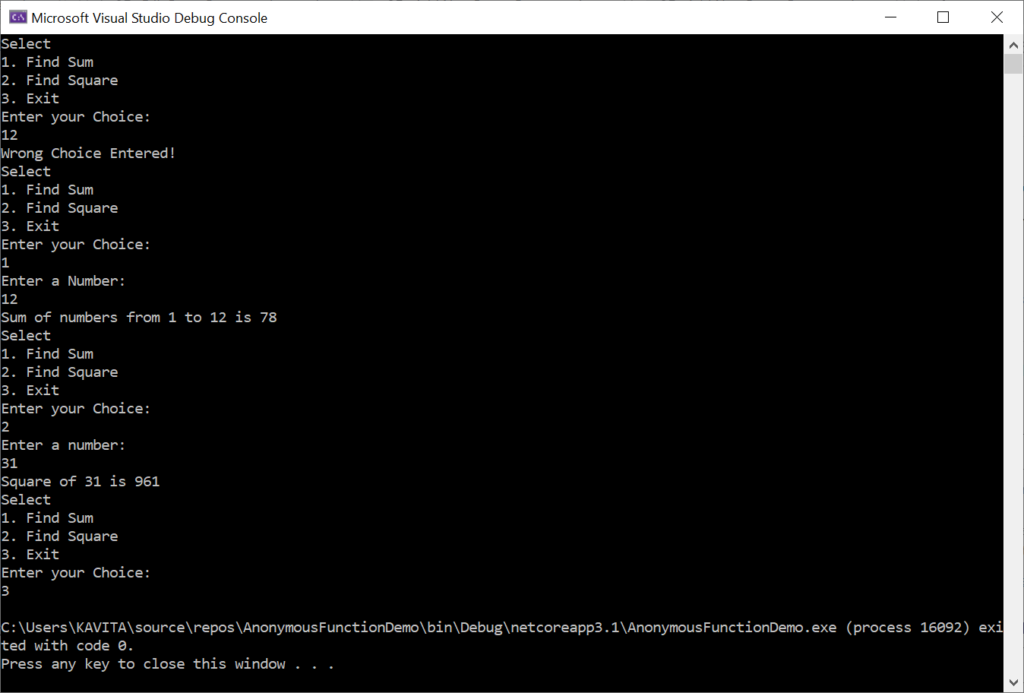The following program demonstrates an Example of Anonymous Functions in C#.
An anonymous function is a function that doesn’t have a name. In C#, an anonymous function is created with the help of a delegate. In order to define an anonymous function, first we create a delegate with an appropriate signature. After that, we create an object of the delegate and assign the function to the object of the delegate. Once, the anonymous function is defined, it is called using the delegate object.
The following program declares two delegates – del1, and del2. Since del1 doesn’t take any argument, we can use to refer to function with no argument. Similarly, del2 can refer to a function that takes an argument of integer type.
using System;
namespace AnonymousFunctionDemo
{
class Program
{
delegate int del1();
delegate int del2(int n);
static void Main(string[] args)
{
while(true)
{
Console.WriteLine(@"Select
1. Find Sum
2. Find Square
3. Exit");
Console.WriteLine("Enter your Choice: ");
int ch = Int32.Parse(Console.ReadLine());
switch(ch)
{
case 1:
del1 ob1 = delegate ()
{
Console.WriteLine("Enter a Number: ");
int x = Int32.Parse(Console.ReadLine());
int sum = 0;
for(int i=0;i<=x;i++)
{
sum += i;
}
Console.Write("Sum of numbers from 1 to {0} is ", x);
return sum;
};
int s = ob1();
Console.WriteLine(s);
break;
case 2:
Console.WriteLine("Enter a number: ");
int y = Int32.Parse(Console.ReadLine());
del2 ob2 = delegate (int i)
{
int sq = 0;
for(int j=1;j<=i;j++)
{
sq += i;
}
return sq;
};
int z = ob2(y);
Console.WriteLine("Square of {0} is {1}", y, z);
break;
case 3:Environment.Exit(0);
break;
default:Console.WriteLine("Wrong Choice Entered!");
break;
}
}
}
}
}
Output

Further Reading
How to Create Instance Variables and Class Variables in Python
Comparing Rows of Two Tables with ADO.NET
Example of Label and Textbox Control in ASP.NET
One Dimensional and Two Dimensuonal Indexers in C#
Private and Static Constructors in C#
- AI
- Android
- Angular
- ASP.NET
- Augmented Reality
- AWS
- Bioinformatics
- Biometrics
- Blockchain
- Bootstrap
- C
- C#
- C++
- Cloud Computing
- Competitions
- Courses
- CSS
- Cyber Security
- Data Science
- Data Structures and Algorithms
- Data Visualization
- Datafication
- Deep Learning
- DevOps
- Digital Forensic
- Digital Trust
- Digital Twins
- Django
- Docker
- Dot Net Framework
- Drones
- Elasticsearch
- ES6
- Extended Reality
- Flutter and Dart
- Full Stack Development
- Git
- Go
- HTML
- Image Processing
- IoT
- IT
- Java
- JavaScript
- Kotlin
- Latex
- Machine Learning
- MEAN Stack
- MERN Stack
- Microservices
- MongoDB
- NodeJS
- PHP
- Power Bi
- Projects
- Python
- Quantum Computing
- React
- Robotics
- Rust
- Scratch 3.0
- Shell Script
- Smart City
- Software
- Solidity
- SQL
- SQLite
- Tecgnology
- Tkinter
- TypeScript
- VB.NET
- Virtual Reality
- Web Designing
- WebAssembly
- XML